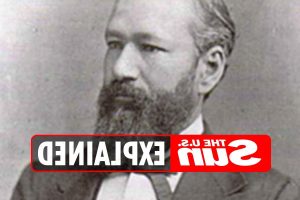What is Plessy vs Ferguson?

A COURT case from the 1800s has been revisited in 2022.
On Wednesday, January 5, Louisiana’s governor posthumously pardoned Homer Plessy.
What is Plessy vs Ferguson?
On June 7, 1892, Homer Plessy – a man of mixed race – purchased a train ticket at the Press Street Depot in New Orleans.
He proceeded to board a "Whites Only" car, which at the time was illegal for a person of Black descent.
Louisiana enacted the Separate Car Act in 1890, which required all railroads in the state to provide "equal but separate" accommodations for white and Black passengers.
Plessy sat in a seat in the area designated for white travelers, and was immediately arrested by a private detective after he refused to move.
During his original trial, Plessy's lawyers argued that the state law requiring segregated train cars was unconstitutional, directly denying his rights under the Thirteenth and Fourteenth Amendments, which should provide equal treatment regardless of race.
The judge, John Ferguson, ruled that Louisiana had the right to regulate rules within state boundaries, resulting in Plessy being convicted and fined.
Plessy's appeal was then taken to the Supreme Court of Louisiana, which upheld Ferguson's ruling.
On April 13, 1896, another appeal was heard in the United States Supreme Court.
One month later, on May 18, the Supreme Court issued a 7-1 decision, ruling against Plessy.
Most read in US News
TRAGIC DEATH Rapper's fans share songs after Florida star ‘shot himself and girlfriend'
Boy, 5, looking for his half-blind sister, 7, in park after she vanished
Dad shot dead in front of his daughter, 6, as he carried cake to her party
George Floyd’s great niece cried ‘Daddy I’ve been hit’ after being shot in bed
What are the 13th and 14th Amendments?
Within the Thirteenth Amendment are two sections.
According to section one: "Neither slavery nor involuntary servitude, except as a punishment for crime whereof the party shall have been duly convicted, shall exist within the United States, or any place subject to their jurisdiction."
The second section adds: "Congress shall have power to enforce this article by appropriate legislation."
Although many believed the end of slavery came with the Emancipation of Proclamation in 1863, the true abolition of slavery was achieved when the Thirteenth Amendment was ratified two years later.
On July 9, 1868, the Fourteenth Amendment of the Constitution granted citizenship to all people born or naturalized in the United States.
Specifically, the amendment states: "No State shall make or enforce any law which shall abridge the privileges or immunities of citizens of the United States; nor shall any State deprive any person of life, liberty, or property, without due process of law; nor deny to any person within its jurisdiction the equal protection of the laws."
Was Homer Plessy pardoned?
Louisiana governor, John Bel Edwards, pardoned the late Homer Plessy on Wednesday, January 5, 2022.
Edwards scheduled the pardon ceremony for a spot near where Plessy was arrested in 1892, close to the 125th anniversary of his guilty plea.
"Hopefully, this will give some relief to generations who have suffered under discriminatory laws," said Phoebe Ferguson, great-great-granddaughter of the judge from the Plessy trial.
Although Homer Plessy had no children or direct descendents, members of his family also participated in the pardoning ceremony.
Keith Plessy, the great-great-grandson of Plessy's cousin, said the trial "spotlights New Orleans as the cradle of the civil rights movement," according to NBC.
We pay for your stories!
Do you have a story for The US Sun team?
Email us at [email protected] or call 212 416 4552.
Like us on Facebook at www.facebook.com/TheSunUS and follow us from our main Twitter account at @TheSunUS
Source: Read Full Article






